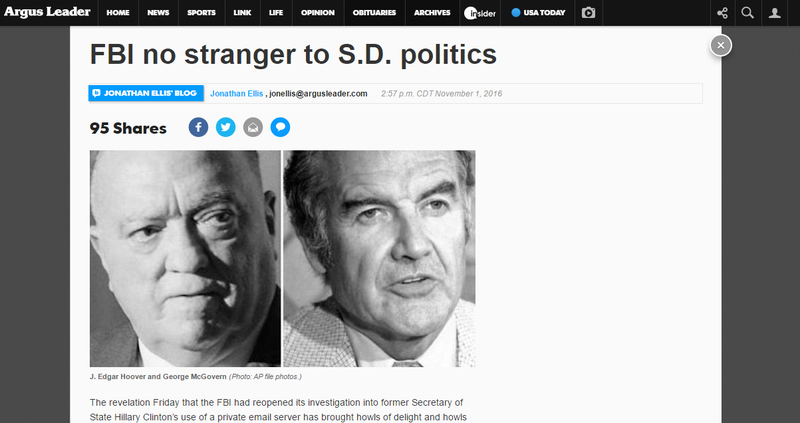J. Edgar Hoover and George McGovern
The revelation Friday that the FBI had reopened its investigation into former Secretary of State Hillary Clinton’s use of a private email server has brought howls of delight and howls of indignation.
Delight from Republicans. Indignation from Democrats.
Retiring Senate Minority Leader Harry Reid, D-Nevada, has complained that FBI Director James Comey violated the Hatch Act when he sent a letter to Congress on Friday outlining the discovery of potentially new emails that might not have been reviewed in an investigation that Comey closed earlier this summer. The Hatch Act forbids some government officials from engaging in politics.
As all of this sorts itself out, it’s worth noting that the FBI has influenced South Dakota elections – including the legendary J. Edgar Hoover, the longtime director who built the FBI into his personal fiefdom.
But one doesn’t need to travel back to the distant past to find examples of FBI involvement in elections. Take 2014, for example.
Less than three weeks before the election, an FBI official suddenly, and seemingly without prompting, announced that an investigation into the state’s EB-5 program was “active.” At the time, former Gov. Mike Rounds was fending off a fierce onslaught from Democrats in his bid to win an open Senate seat.
During his two terms as governor, Rounds had actively promoted the EB-5 Immigrant Investor Program, which enables wealthy foreigners to get a visa by contributing $500,000 to qualified economic development programs. The state used EB-5 funding on more than a dozen projects, ranging from diaries, energy projects and even a casino.
But most famously, the program was used for the Northern Beef Packers Plant in Aberdeen, a pet project of Rounds’ that went belly-up in bankruptcy three years after Rounds left office. State officials learned in early 2013 that the FBI was investigating the state’s EB-5 program, and in October of that year, Rounds’ cabinet secretary who administered the program committed suicide just as he was about to be indicted.
Little had been heard about the investigation for months until the FBI’s surprise announcement. It provoked an angry response from Dick Wadhams, one of Rounds’ political advisers, who accused former U.S. Attorney Brendan Johnson of trying to influence the election. Rounds, a Republican, was campaigning to win the seat of retiring Democratic Sen. Tim Johnson, father of Brendan Johnson.
Attorney General Marty Jackley complained to Eric Holder, who was then U.S. attorney general, that the Justice Department was politicizing its investigation into the state’s EB-5 program with an intent to hurt Rounds.
Then on June 1, 2015, the FBI announced that its investigation was closed.
Rounds obviously weathered the announcement to win his election, but Hoover’s involvement in the 1960 election might have cost George McGovern his first Senate race.
McGovern was running against Republican icon Karl Mundt. In the weeks before the election, Hoover sent a letter to the Argus Leader praising Mundt for being one of the stalwarts in Congress against the Communist Menace. Mundt had been responding to a letter from Argus Leader editor Fred Christopherson, who asked Hoover to identify the people in Congress that he thought were strongest against communism (Christopherson was anti-Communist and pro-Mundt). Hoover’s letter was printed on the front page of the Argus Leader a month before the election.
McGovern lost by a percentage point, and he blamed the loss in part on Hoover’s meddling. The extent of his anger was evident in the FBI’s file on McGovern, which was released to Argus Leader Media last year in a Freedom of Information Act request.
McGovern’s anger at Hoover made its way back to the FBI from a few sources. One of those sources was John Kennedy, the publisher of the Argus Leader. Kennedy had a post-election conversation with McGovern in January 1961. McGovern expressed his anger about the Hoover letter. In Kennedy’s words, he was “hot under the collar.” Kennedy wanted to warn Hoover about McGovern’s anger, in part because McGovern was friends with Hoover’s new boss, Attorney General Bobby Kennedy and the president, John F. Kennedy. The publisher was concerned that McGovern might use those friendships to create trouble for Hoover.
Ultimately, McGovern did create trouble for Hoover. He won his second Senate race in 1962. Later in his career, he would publicly denounce Hoover. The FBI’s records on McGovern, which included information on McGovern fathering at least one out-of-wedlock child, mysteriously ended up with the Nixon campaign during McGovern’s 1972 presidential bid. The Nixon campaign refrained from using the materials because McGovern was so far behind.
This is not to suggest that Comey’s letter to Congress is politically motivated. But it does highlight the hypocrisy that runs deep in our political system. You didn’t hear Harry Reid complain when the FBI’s surprise EB-5 announcement was used in an attempt to tank Rounds’ Senate campaign.
Mentions
Litigation Cases
States
- South Dakota
Videos





Subscribe for News
Site Digest
Join Professionals on EB5Projects.com →
Securities Disclaimer
This website is for informational purposes only and does not constitute an offer or solicitation to sell shares or securities. Any such offer or solicitation will be made only by means of an investment's confidential Offering Memorandum and in accordance with the terms of all applicable securities and other laws. This website does not constitute or form part of, and should not be construed as, any offer for sale or subscription of, or any invitation to offer to buy or subscribe for, any securities, nor should it or any part of it form the basis of, or be relied on in any connection with, any contract or commitment whatsoever. EB5Projects.com LLC and its affiliates expressly disclaim any and all responsibility for any direct or consequential loss or damage of any kind whatsoever arising directly or indirectly from: (i) reliance on any information contained in the website, (ii) any error, omission or inaccuracy in any such information or (iii) any action resulting therefrom.



